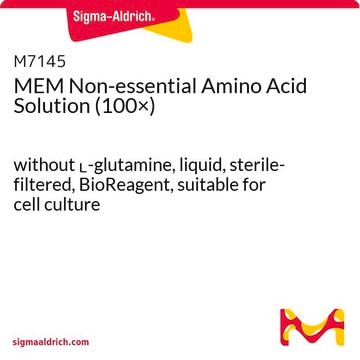M4655
Minimum Essential Medium Eagle
With Earle′s salts, L-glutamine and sodium bicarbonate, liquid, sterile-filtered, suitable for cell culture
Synonym(s):
EMEM, MEM
About This Item
Recommended Products
Quality Level
sterility
sterile-filtered
form
liquid
technique(s)
cell culture | mammalian: suitable
impurities
endotoxin, tested
components
sodium pyruvate: no
phenol red: yes
Earle’s salts (5% CO2): yes
HEPES: no
NaHCO3: yes
L-glutamine: yes
shipped in
ambient
storage temp.
2-8°C
Looking for similar products? Visit Product Comparison Guide
General description
MEM, which incorporates these modifications, includes higher concentrations of amino acids so the medium more closely approximates the protein composition of cultured mammalian cells. MEM has been used for cultivation of a wide variety of cells grown in monolayers. Optional supplementation of non-essential amino acids to the formulations that incorporate either Hanks′ or Earle′s salts has broadened the usefulness of this medium.
Application
Other Notes
also commonly purchased with this product
related product
Storage Class Code
12 - Non Combustible Liquids
WGK
WGK 1
Flash Point(F)
Not applicable
Flash Point(C)
Not applicable
Certificates of Analysis (COA)
Search for Certificates of Analysis (COA) by entering the products Lot/Batch Number. Lot and Batch Numbers can be found on a product’s label following the words ‘Lot’ or ‘Batch’.
Already Own This Product?
Find documentation for the products that you have recently purchased in the Document Library.
Customers Also Viewed
Articles
Calcium is an ionically stable divalent cation with important beneficial and toxic properties in cell culture. It is a component of a wide range of cell culture media.
Calcium is an ionically stable divalent cation with important beneficial and toxic properties in cell culture. It is a component of a wide range of cell culture media.
Calcium is an ionically stable divalent cation with important beneficial and toxic properties in cell culture. It is a component of a wide range of cell culture media.
Calcium is an ionically stable divalent cation with important beneficial and toxic properties in cell culture. It is a component of a wide range of cell culture media.
Our team of scientists has experience in all areas of research including Life Science, Material Science, Chemical Synthesis, Chromatography, Analytical and many others.
Contact Technical Service






